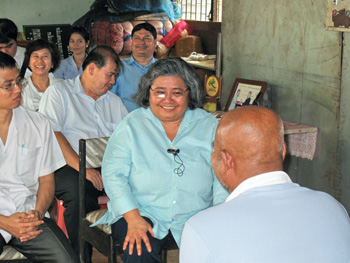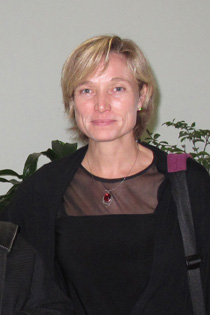Unlikely Kenyan bus encounter sparks project with a living legend
Surrounded by people speaking Swahili, Arabic and Gogo on a sweltering bus ride in Kenya, the last person Southeast Asia historian Tamara Loos expected to encounter was a Thai scientist.
"I felt an urgent sense of relief and belonging when I heard someone speaking central Thai," Loos later wrote. "It became one of those frozen moments of time: It was too strange and personal to be coincidental, and I felt that my life was about to change."

Provided
Pharmaceutical chemist and activist Krisana Kraisintu, who created the first generic "cocktail" pill for the treatment of HIV/AIDS, chats with farmers who grow organic cumin in the south of Thailand.
Loos, an associate professor of history, made her way over to the woman and introduced herself in Thai. The rest, as they say, is history -- or it will be, when Loos finishes a biographical project about the woman on the bus: pharmaceutical chemist and activist Krisana Kraisintu. Loos recently received a faculty grant from Cornell's Society for the Humanities to support the work. Loos calls Kraisintu "an amazing, innovative figure" who created the first generic "cocktail" pill for the treatment of HIV/AIDS, which has saved millions of lives in developing countries. Perhaps not surprising for a professor who teaches a class titled "Subversion as Foreign Policy," Loos is particularly inspired by Kraisintu's "audacious and unwavering conviction that 'teaching people how to fish is better than giving them fish.'" Kraisintu provides drug formulas and pharmaceutical training gratis to the poorest African countries, Loos says, "to break the cycle of dependency of lesser developed countries on wealthier countries and multinational pharmaceutical companies." Kraisintu has thus saved thousands of lives in Thailand, Africa and other countries by formulating and manufacturing affordable generic drugs to treat HIV/AIDS, malaria and other maladies that strike the poor in particular.
Such generosity has not come without risk, however. When Kraisintu arrived in the Democratic Republic of Congo to help establish an HIV/AIDS drug manufacturing facility, she found herself in the middle of a civil war. She has been bullied by representatives of multinational drug companies, threatened by officials and forced to do her research in a closet -- literally.

Provided
Tamara Loos, associate professor of history and a Southeast Asia historian.
In addition to extensive on-site interviews with Kraisintu, Loos plans to use Kraisintu's writings in her native Thai as a foundation for the project.
Writing about a living person's history is a new experience for Loos, but, she says with an infectious smile, "I want to do it now while Krisana still wants me to." And Loos hopes that introducing Kraisintu's efforts to an English-speaking audience will help in her work.
Loos' more usual subject matter includes studies of sex and politics, transnational sexualities, comparative law, sodomy, the family, suffrage, intimate violence, rape and notions of liberty in Thailand. Her first book, "Subject Siam: Family, Law, and Colonial Modernity in Thailand," considered Siam's place as a colonized and colonizing power in Southeast Asia. Her current book project, "Violent Intimacies: Affect in Siam," seeks to integrate emotions, affect and violence into history generally and Thai history in particular. The project is organized around five key court cases and begins with a case of romantic love turned sour between a young Siamese man and a British woman in 1900. The project asks what access historians have to emotions, whether emotions have a place in the writing of history and, if so, what place that is.
Linda Glaser is a freelance writer in Ithaca.